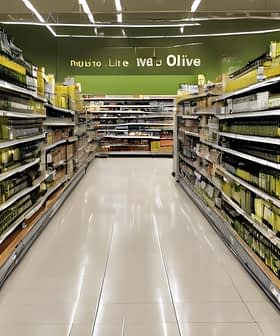Spain Reacts to U.S. Tariff on Olive Oil
The announcement of the U.S. tariffs comes as protestors head to Madrid to demand action on low olive oil prices. Government officials fear Andalusia, one of Spain's poorest regions, will be hit the hardest by the tariffs.
 Harvesting olives in Andalusia
Harvesting olives in AndalusiaAs the dust settles on the United States Trade Representative’s (USTR) decision to impose retaliatory tariffs on $7.5 billion worth of imported goods from the European Union, Spanish olive growers, oil producers and government officials are left to work out what comes next.
Last week, the USTR imposed a 25 percent tariff on imports of Spanish virgin and non-virgin olive oil in all of its fractions in containers of less than 18 kilograms (39.7 lbs) as part of a series of retaliatory countermeasures against E.U. countries that illegally subsidized aircraft manufacturer Airbus.
(The United States) cannot take the agricultural products of Spain and Andalusia hostage.
Cristobal Gallego, the head of olive oil for Andalusia’s Coordinator of Agriculture and Livestock Organizations (COAG), estimates that these tariffs will directly impact 50,000 tons of Spanish olive oil exports to the U.S., about 43 percent of Spain’s annual export total to the country.
Gallego also advocates for a “blunt” response from the E.U. to the U.S. tariffs but warned against any type of retaliation that would lead to an escalation in the growing trade dispute.
See Also:Olive Oil Trade NewsLuis Planas, Spain’s Minister of Agriculture, Food and Fisheries, also called on the E.U. to work with the Spanish government in order to protect the trading bloc’s agricultural sector from the impacts of the U.S. tariffs.
“We are all united in the firmness of the negotiation that the European Union must follow with the United States so that the agri-food sector is left out of this dispute and is not affected by possible commercial sanctions, since it is not the subject of the discussion,” he said.
Already, olive oil prices in Spain have fallen as a result of the impending tariffs. According to the most recent data from Poolred, an organization that tracks olive oil prices, the average price of extra virgin olive oil dropped by five percent, down to €2.104 ($2.310) per kilogram. Virgin olive oil prices and olive oil lampante prices also fell slightly.
In recent weeks, prices had remained steady and even increased a bit. Some in the Spanish olive oil sector had expressed cautious optimism that an off-year harvest combined with new measures from the European Commission regarding self-regulation would help prices recover.
Provoked by these low olive oil prices, thousands of olive farmers and oil producers are set to protest in Madrid on October 10. Organizers estimate that 13,000 producers will head to the Spanish capital demanding aid for those struggling to get by due to the low prices.
The newly imposed tariffs will also be high on the list of protestors’ concerns. Olive oil exports from the rest of the E.U. were removed from the initial list of retaliatory tariffs, leaving Spanish producers at a sharp competitive disadvantage.
“That 25 percent tariff means that after October 18 we will lose the U.S. market; we will not be able to rival our competitors,” Rafael Pico Lapuente, the director of the Spanish Association of Olive Oil Exporting, Industry and Commerce (Asoliva), told German state broadcaster DW. “We also do not have the chance to sell 230,000 tons in other markets outside the U.S. For us, this loss is a catastrophe.”
According to data from the U.S. Department of Commerce, Spain exported 115,000 tons of olive oil – worth about €400 million ($439 million) – to the U.S. last year, which made up slightly more than 35 percent of all American olive oil imports.
Government officials worry that this significant economic loss will hit Andalusia the hardest. The southern Spanish autonomous community is responsible for 80 percent of Spain’s olive oil production and is still suffering economic hardships from the 2008 financial crisis, with unemployment rates still as high as 23 percent and youth unemployment at a staggering 40 percent.
“[The United States] cannot take the agricultural products of Spain and Andalusia hostage,” Carmen Crespo, the autonomous community’s Minister of Agriculture, Livestock, Fisheries and Sustainable Development, said.
She will head to Madrid to discuss an appropriate response to the tariffs with Planas and other government officials.
“[We need] a common front of all administrations along with the European Union that allows us to mitigate these circumstances, which have a very negative influence on the trade of our products and make it infeasible that farmers and producers get a fair price, putting their competitiveness at risk,” she added.








